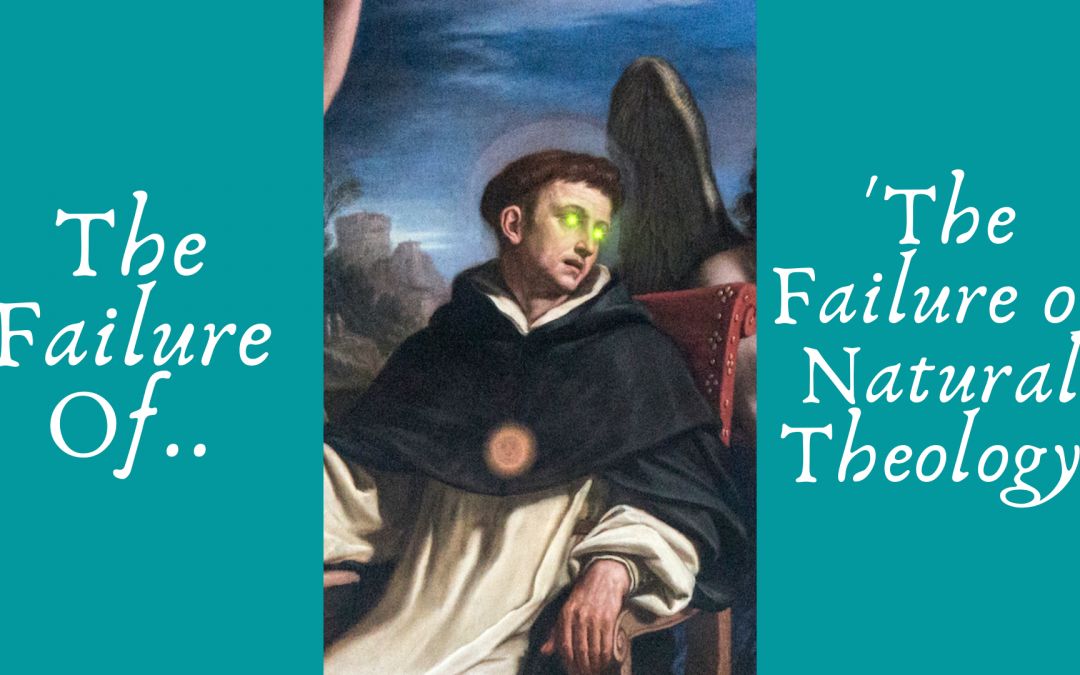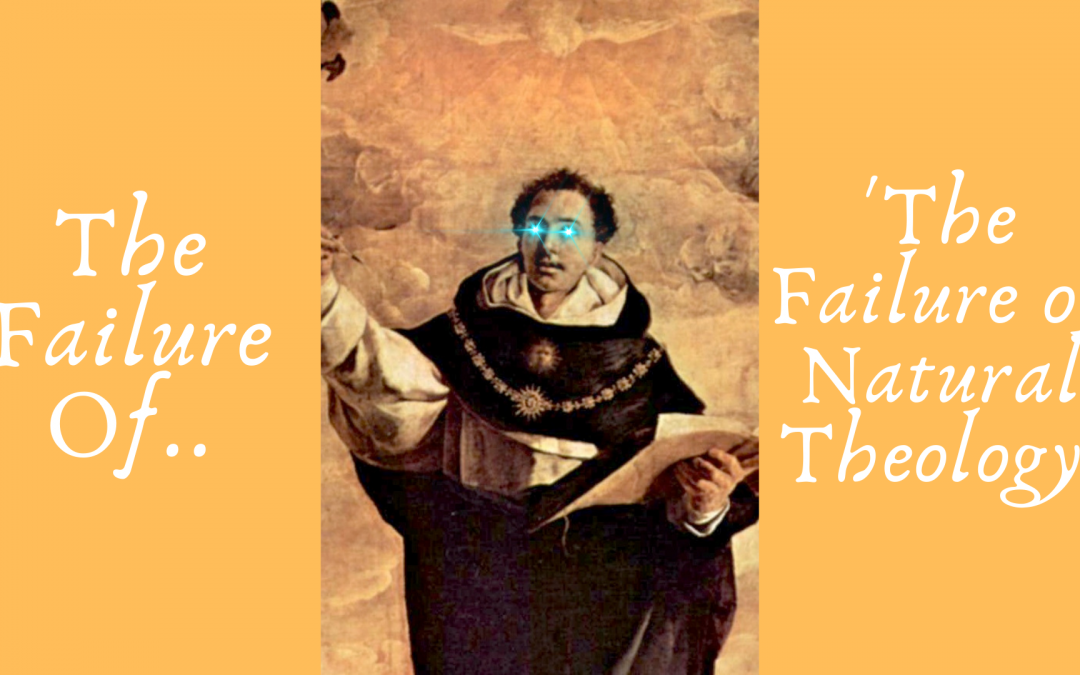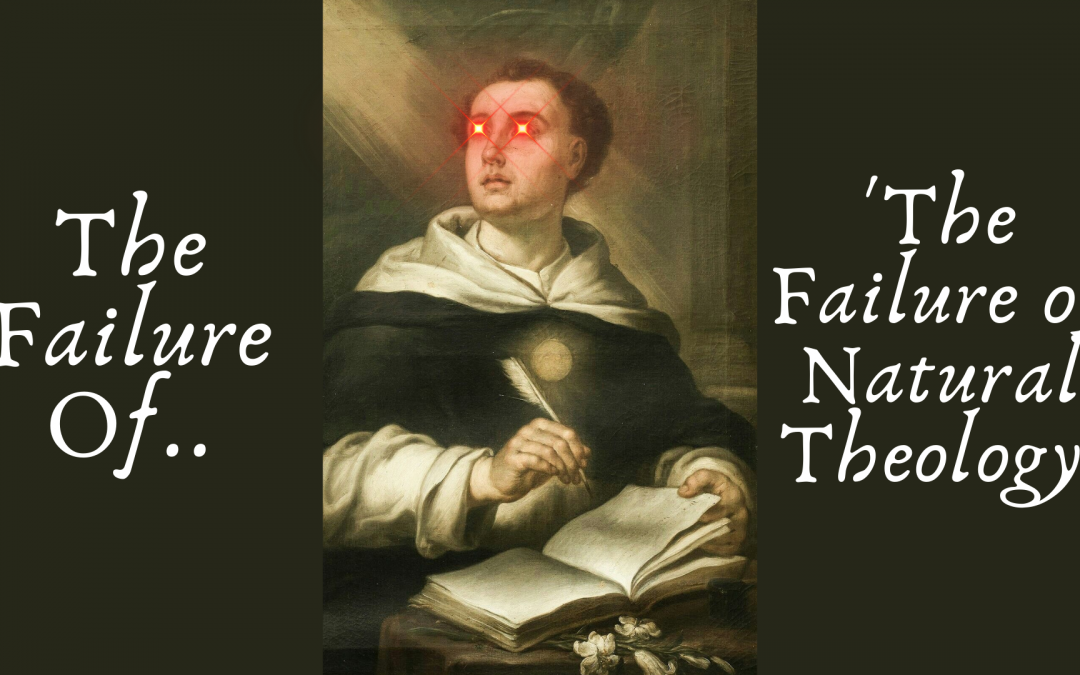God sees all other things in continual motion under his feet, like water passing away and no more seen; while he remains fixed and immovable… the centre is never moved… it remains immovable in the midst of the circle; “There is no variableness nor shadow of turning with him” (James i. 17).
~ Stephen Charnock, The Existence and Attributes of God, vol. 1, (Grand Rapids: Baker Book House, 1979), 316-17.
I only wish to observe… that this method of investigating the divine perfections, by tracing the lineaments of his countenance as shadowed forth in the firmament and on the earth, is common both to those within and to those without the pale of the church.
~ John Calvin, Institutes of the Christian Religion, (Peabody: Hendrickson Publishers, 2008), 20.
In the previous two installments, we looked at chs. 1-6, collectively. We have, thus far, seen Johnson reject natural theology. We have seen him claim that God is not actus purus. We have seen him introduce motion to within the Godhead. Along with this, we have seen him misrepresent fellow authors, such as R. C. Sproul and even Thomas Aquinas himself. In this final part, we will see Dr. Johnson continue in all the above; but this time, be on the look-out for specific denials of immutability (though he claims he affirms it), a reaffirmation of Kanitan idealism, in principle, and, most nauseatingly, the location of individual consciousness to within each divine Person (cf. the latter portion of this article). The Father’s consciousness is distinguished from the Son’s, and so on… The book ends in a cataclysmic mingling of analogical and univocal predication, which I will attempt to untangle, at least in part.
By the time I reached the end of this book, I simply didn’t see any God left. All that remained was creature. Such is the end of theistic personalism and/or process theism.
Nevertheless, without any further ado—
The Problems of Divine Immobility
Again, tracing Aquinas’ alleged theological and philosophical errors to Aristotle (the boogeyman), Johnson writes, “because of his commitment to the metaphysics of Aristotle, Aquinas added an attribute to God’s nature that is not revealed in the Scriptures—divine immobility (FNT, 136).” This, of course, is a negative development in the eyes of Johnson. But would Scripture agree? Surely not. “Every good gift and every perfect gift is from above, and comes down from the Father of lights, with whom there is no variation or shadow of turning (Jas. 1:17).” The term for “variation” signifies only mutability, which Johnson claims to deny. How he mutability in God whilst affirming motion in God is yet beyond me, and is never meaningfully explained in his book. However, the second word, “turning,” refers to the revolutions of the heavenly bodies, characterized precisely by motion. There would be no reason to use these terms together unless one were trying to emphasize a particular way in which God does not change, i.e. through movement or motion, as all other contingency does.
Though Johnson wants to argue against the notion of nature giving us any sure knowledge of the transcendent God-realm, James sure seems to think it does when he uses a cosmological term in order to illustrate the nature of God—analogically of course (we’ll get there). Johnson says, “not only is the concept of divine immobility not compatible with apologetics, it is also incompatible with theology (FNT, 136. Emphasis added).” Yet, he never explains this statement in light of some of the most relevant biblical data we have on the subject. So much, it seems, for the centrality of special revelation. If Scripture occupies such an exclusive spot in theological science, one would think a person who’s entire business it is to defend such a notion—whilst tearing down the opposite opinion—would practice what he “preaches.” As it is, all I see in Jeff’s work is philosophical conjecture, the very enemy he set out to destroy in the first place.
He goes on, “The Bible does not teach divine immovability… [God] didn’t come into existence or need any external power to actualize any passive potency within him. God is God (FNT, 137).” Yet, God did need motion, in order to create according to Johnson, “Because he is not stuck in a motionless state, creation does not have to be necessary or eternal. The self-moving God is free to create, govern, and relate without altering his simple essence in the process (FNT, 163).” Either motion and God are one and the same, or motion is a part in God, a part that is not identified with God, yet nevertheless required by God if He is to bring about a new world. Purely and simply, Johnson has just introduced contingency, or dependence into the divine essence. If motion is God, there is no place for immutability. But if it is a part of God, it follows God depends upon it to do what He does.
Quoting from Herman Bavinck, Johnson tries to further bolster his point, “Immutability… should not be confused with monotonous sameness or rigid immobility (FNT, 137).” This, Johnson believes, aligns his position with historical Reformed orthodoxy. But let’s hold Johnson to his own standard and see if he uses Bavinck in context. Bavinck says—
Scripture necessarily speaks of God in anthropomorphic language. Yet, however anthropomorphic its language, it at the same time prohibits us from positing any change in God himself [ad intra]. There is change around, about, and outside of him, and there is change in people’s relations to him, but there is no change in God himself. In fact, God’s incomprehensible greatness and, by implication, the glory of the Christian confession are precisely that God, through immutable in himself, can call mutable creatures into being (Reformed Dogmatics, vol. 2, 158).
The problem, however, is that Johnson doesn’t believe that an unchanging God ad intra can affect change in creatures. God must be able to move in order to create or change His creation. Lest there be any confusion, Bavinck strengthens his claim on the next page—
We should not picture God as putting himself in any relation to any creature of his as though it could even in any way exist without him. Rather, he himself puts all things in those relations to himself, which he eternally and immutably wills—precisely in the way in which and at the time at which these relations occur Dogmatics, vol. 2, 159).
The misrepresentation of Bavinck on this point is monumental, but it does not stop with him. He misrepresents William Perkins, the father of puritanism, as well. He says, “And Puritan William Perkins identified the life of God as that ‘by which the Divine nature is in perpetual action, living, and moving in itself (FNT, 138).’” But here, Perkins only alludes to the emperichoresis spoken of by Turretin and others. It teaches a mutual and eternal indwelling of the divine relations, one into the other. But this is not to be confused with the perichoretic theology of the Celts, for example. Perkins is not alluding to an intra-Trinitarian movement, per se, nor ad intra, but God as actus purus, or pure actuality (which Perkins, no doubt, affirms). And thus, his mention of motion, in light of what he says immediately thereafter, must be seen as an improper allusion to God as life in contrast to death (“movement” poetically indicating life rather than the contradiction thereof).
Perkins, for example, says in an earlier part of the same volume, “The simpleness of His nature is that by which He is void of all logical relation in arguments. He has not in Him subject or adjunct (Works, vol. 6, 12).” This denies real predication in God, something Johnson denies by applying motion to the divine essence. Perkins says in the same place, “Hence it is manifest that to have life and to be life, to be in light and to be light in God are all one. Neither is God subject to generality or speciality, whole or parts, matter or that which is made of matter… Therefore, whatever is in God is His essence; and all that He is, He is by essence.” Quoting Augustine, he says, “In God… to be and to be just or mighty are all one; but in the mind of man, it is not all one to be and to be mighty or just. For the mind may be destitute of these virtues and yet be a mind.” He concludes, “Hence it is manifest that the nature of God is immutable and spiritual (Works, vol. 6, 13).”
Quite to the contrary does Johnson state, “without differentiation within God, there is no real possibility for God to subsist in three differentiated and distinct persons. In other words, if there is no ad intra differentiation in God, there is no Trinity (FNT, 138).” Richard Muller, however, sets the historical and theological picture aright when he says:
Since the existence of God is identical with the divine essence, Keckermann continues, it must be fundamental rule of trinitarian doctrine that the mode or manner (modus) of God’s existence does not differ from the mode of His essence. It is not as if there can be diverse “things” in God—rather the divine modi existential must be God himself (PRRD, vol. 4, 208).
Turretin writes, “the singular numerical essence is communicated to the three persons not as a species to individuals or a second substance to the first (because it is singular and undivided), nor as a whole to its parts (since it is infinite and impartable); but as a singular nature to its own act of being (suppositis) in which it takes on various modes of subsisting (Institutes, vol. 1, 265).” Neither Perkins, Turretin, Keckermann, or Muller permitted what Johnson called “differentiation” in God, ad intra. This is an entirely a-historical and heterodoxical assertion.
Before he closes this chapter, he returns once more to the alleged war between philosophy and revelation, “This means that neither man, by the use of philosophy, nor God, by means of revelation, can penetrate the transcendental wall that separates God from man (FNT, 147).” Aside from the idealism assumed in this statement, which is not Christian by any stretch of the imagination, one could ask, “But, does one’s hermeneutical philosophy determine what one thinks about the Bible?” If so, then it would seem that the hard and fast separation between philosophy and theology is unwarranted. There are, most certainly, hermeneutical principles not taught in the Scripture which must nevertheless be assumed in order to interpret the Scripture aright, e.g. the laws of logic and even the existence of God (Heb. 11:6).
Alluding to what he will say in ch. 9, Johnson critically summarizes Aquinas, “God may be able to communicate, but his communication is restricted to the use of earthly symbols and physical metaphors… Man’s relationship with God cannot be with the real God that remains locked behind the transcendental wall (FNT, 148).” Note, Johnson never defines what the term real means when he speaks of real knowledge or real relationship, even though this realness characterizes what Johnson thinks is a defeater for Thomas’ view.
The Necessity of the Trinity
Aside from Van Til’s doctrine of equal ultimacy, which I will not get into here, and following some neat biographical facts about Thomas, Johnson begins quoting Dr. Craig Carter. In an effort to make Carter appear as if he rejected any inkling of relatability from creature to Creator, Johnson writes, “a God without differentiation is a non-Trinitarian God who cannot create, communicate, or relate. Craig Carter, for instance, denied God’s relatability (FNT, 156).” He then quotes Carter, saying, “The false gods are relational because they are creatures; Yahweh is not relational because he is not a creature. Therefore, to worship a relational god is to worship the creature rather than the Creator, which is Paul’s definition of idolatry in Romans 1:22 (FNT, 156-157).”
Carter, however, explains himself quite thoroughly in the interview from which Johnson quotes—
Nicene Trinitarian theology, however, sees the relationality of God to be wholly internal to the simple, perfect, eternal being of God. The only distinction we can identify between the Father, Son and Spirit are the relations of origin: generation and spiration. These relations of origin are eternal and unchanging, and they are part of God’s own being, not ways by which he relates to creation. The missions of the Son and Spirit into the world must not be confused with the processions, which are internal to God (Credo Magazine, vol. 10, Issue 2).
Carter obviously does not deny all creaturely relation to God, as Johnson intimates. Instead, he denies reciprocal relationality between Creator and creature. The creature, in verbal form, relates to God, though God has not undergone change in order to relate to creature. He says in the same place:
The missions indeed involve a relation between God and the world but not in a two-way fashion such that God is changed by the world. As Augustine put it, when God becomes our refuge (Ps. 90:1), the change is a result of our faith. By placing our faith in God, he becomes our refuge, but not because God has changed but because we have changed.
Johnson, while “critically” interacting with Carter, never actually gives Carter the light of day. No matter the fact Carter is only restating what men such as Stephen Charnock have already said, that God, as “the center is never moved… remains immovable in the midst of the circle (Existence, vol. 2, 317).”
Johnson goes on to misuse Turretin as well. He says, “Francis Turretin said there is a clear distinction between the one essence of God and the three persons of God (FNT, 159).” Johnson is here trying to historically vindicate his doctrine of ad intra differentiation. But he is never transparent about Turretin’s intention. “The former,” he quotes Turretin, “is absolute, the latter are relative.” If he were to have proceeded in his study of Turretin, he would have understood Turretin was not speaking ad intra. Turretin says, “but eminently and analogically, all imperfection being removed. Thus the person may be said to differ from the essence not really (realiter), i.e., essentially (essentialiter) as thing and thing, but modally (modaliter)—as a mode from the thing (modus a re) (Institutes, vol. 1, 278).” Turretin further says:
Here we do not have a thing and a thing, but a thing and the modes of the thing by which it is not compounded but distinguished. Again, composition belongs to those things which are related to each other as power and act (which cannot be granted here). Nor can the term composition be applied to God without implying imperfection.
Peter van Mastricht writes, “A twofold difference occurs. The first difference is that through which a person differs from the essence: certainly not a real difference, in which they differ as one thing and another thing (Theoretical-Practical Theology, vol. 2, 503).” From an historical vantage point, then, Johnson’s ad intra differentiation falls flat. From a philosophical or logical one, it is altogether absurd and even forbidden by a comprehensive meaning of Scripture.
Johnson, within the next couple pages, quips, “A system that prioritizes unity tends to end up with a supreme principle of unity that contains no diversity (FNT, 161).” Interestingly, he doesn’t make the opposite charge, that of placing too high a price on plurality, to any similar extent. The fruit of this has been Johnson’s 200-page book, supposedly intended to refute Thomas’ natural theology, but which actually slices God into too many parts to count. By the end, it leaves one wondering, “Where, exactly, is the unity part (Deut. 6:4)?”
He affirms simplicity, but he goes on to differentiate, realiter, between the essence and Persons. Yet, the Persons are still all God. But, if each Person is fully God, and there are real differentiations in God, where is the unity? The divine essence and the Father, for example, are really different. Where, then, is the unity? It’s been entirely swallowed up in Johnson’s ax-grinding.
Johnson, returning to motion, says, “God is not dependent on anything outside himself (FNT, 163).” But the integrity or consistency of this statement in relation to the whole book is tested by the question, “What, then, is the motion in God?” Is it God Himself, in which immutability would be entirely exiled from the equation (because, principle of identity)? Or, is it a part of God that is not God per se, which nevertheless moves God? If so, then God does indeed need something that is not Himself, i.e. motion. Johnson may want to answer, “Ah, but the motion is in God!” But if something is in God, it must either be God, or it must be something not-God, “outside” of God, geographical imaginations notwithstanding (I can’t believe I even feel the need to say this).
Because God is in motion, so thinks Johnson, He is, “free to create, govern, and relate without altering his simple essence in the process.” This statement is never explained. He further says, “God does not have to take on new properties to create; he simply had everything he needed within his immutable, eternal, and triune nature to freely act in time and space (FNT, 163).” Yet, if God acts in time, He must change since time is but a measurement of alteration, variation, motion, and change in general. Johnson clearly thinks God needs motion in order to create, “For once God creates and relates, he then ceases to be the unmoved mover (FNT, 169).”
As I hope you, the judicious reader, have discerned—Johnson’s rejection of natural theology and accompanying conflation of ontology with epistemology has accounted for his sour doctrine of God. He says, “Science is impossible to carry out without presupposing the existence of logic, mathematics, and ethics. Thus, without the right transcendental conception of God, knowledge (all knowledge) is impossible (FNT, 170).” Our knowledge not only grants an epistemological context for further knowledge, e.g. of first principles, it must be correct if knowledge is to exist (be possible) whatsoever. This has led Johnson to affirm immediate natural revelation. God has to be the first thing known in order for anything else to be known at all. But this raises another problem. How is God really the first thing known if it’s revelation we know and not God Himself? In other words, there is still a medium between God Himself and our knowledge of Him, i.e. revelation.
Johnson could claim the revelation is God Himself, but that would tend to identify creation with the divine essence, i.e. pantheism. And it would also imply a Cartesian-like doctrine of God, that He is pure thought. Or, Johnson could (rightly) admit revelation is not the divine essence per se, but a created disclosure of the divine essence. But this would, of course, negatively impact his doctrine of immediacy.
Analogical Language
This final chapter helps to explain much of Johnson’s earlier confusion. He either does not understand analogical language, or he is intentionally redefining it. He most certainly revises Thomas without warrant, “when Aquinas said all knowledge of God is analogical, he meant that all knowledge of God is metaphorical… (FNT, 177).” Here he never cites Aquinas in attempting to justify this claim. Metaphor is non-literal predication of something. An example might be, “There is a snake in the grass.” This expression usually refers to foul play afoot, a turncoat or some such. But a turncoat is not a literal snake (unless they’re Satan). This is a figure of speech. The snake is metaphorical. But Thomas affirms literal, and thus non-metaphorical, language about God. He expressly says, “Therefore not all names are applied to God in a metaphorical sense, but there are some which are said of Him in their literal sense (ST, I, Q. 13, Art. 3).” He goes on to write:
According to the preceding article, our knowledge of God is derived from the perfections which flow from Him to creatures, which perfections are in God in a more eminent way than in creatures. Now our intellect apprehends them as they are in creatures, and as it apprehends them it signifies them by names. Therefore as to the names applied to God–viz. the perfections which they signify, such as goodness, life and the like, and their mode of signification. As regards what is signified by these names, they belong properly to God, and more properly than they belong to creatures, and are applied primarily to Him. But as regards their mode of signification, they do not properly and strictly apply to God; for their mode of signification applies to creatures.
Johnson has, therefore, blatantly misrepresented Thomas—as he has with other authors. He doesn’t interact with Thomas at all on this point. There are two reasons Johnson believes Thomas thought all analogical predication concerning God was metaphorical—
Reason one: “Thomas believed an infinite chasm separates us from God. Because there is no probation or gradation between the finite and the infinite, our communication of God, from Aquinas’s perspective, is at best metaphorical, if not altogether mystical (FNT, 177).” Yet, as we’ve seen, Thomas expressly denies all language about God is metaphorical. Moreover, Does it seem as if Johnson implies infinity infinitely surpassing the finite is false? The reader can decide.
Reason two: Johnson thinks Thomas thought, “all knowledge of God is metaphorical… because God has no direct access to us (FNT, 177).” What does it mean for God to have direct access to His creatures? I assume Johnson would say, “It means God reveals Himself immediately to all men.” I would then ask the question I asked earlier, “What is the difference between God on the one hand and revelation on the other?” If revelation is not God, but creature, it continues to be the case that God does not have direct access to creatures in terms of “immediate knowledge,” since knowledge is mediated through revelation and not comprehensive of God ad intra.
He concludes, “for these two reasons, what Aquinas means by analogical language is really metaphorical or symbolical language. But this has its consequence—it not only destroys any real knowledge of God but it destroys any real covenantal relationship with God (FNT, 179).” First, I want to examine what Thomas believed about analogy. Second, I want to connect this language to the incarnation of Christ.
First, for Thomas, analogy is not equivalent to metaphor. Thomas develops his doctrine of analogy beginning with the genus of likeness. He distinguished between three species of likeness: equal likeness, imperfect likeness, and analogical likeness. Equal likeness refers to two things that are, for example, equally white in color. Imperfect likeness refers to two things that are similar, as two white objects, while one is perhaps more vividly white than the other. And analogical likeness refers to two things bearing similarity, not equally noror imperfectly (as if differing on a scale), but generically. For example, existence is common to all. But whereas God has existence of Himself versus creatures participating in existence, Creator and creature share existence, but not according to the formality of a genus. God is not located within a genus, creatures are (ST, I, Q. 4, Art. 3). Thus, there is something like existence in God though it surpasses our mental capacity to define it univocally because, again, God is not in a genus among other genera, distinguished by traits, properties, parts, factors, etc.
In trying to explain his version of analogy, Johnson says that any two analogically related things must have a point of real similarity. He never defines real in this context. I can only guess he meant a “point of identity,” as his comparison shows: “For example,” he says, “oranges and apples are different but similar—they are analogous. They are analogous in that they are different types of fruit, but they are both round pieces of fruit. The real point of similarity is that the word round and the word fruit carry the same meaning for both oranges and apples (FNT, 182).” But what Johnson just described is univocal, not analogical predication. This is because apples and oranges are in the same genus (fruit), and they bear a likeness of equality (roundness). This is definitionally univocal, not analogical. Johnson not only thinks creatures are like God, but also that God is like creatures. I reply, then, with Thomas, “Although it may be admitted that creatures are in some sort like God, it must nowise be admitted that God is like creatures.”
My point is not to write an essay on Thomas’ philosophy of language, but to show to what extent Johnson neglected meaningful interaction with Thomas on this point. It also illustrates Johnson’s implicit assumption that God is just a bigger, better creature, belonging to within a genus like humans.
While much more could be explored and discussed in relation to this chapter, I must end by looking at perhaps one of the most important—and most dangerous—statements in the whole book. Under the heading, “The Trinity Is the Reason God is Immanent and Relational,” Johnson says:
Thomas’s understanding of the Trinity does not allow for the Father, the Son, or the Holy Spirit to have their own distinct self-awareness. And without each of the three persons being self-aware, there can be no communication or interaction (FNT, 185).
How this does not end Johnson in tritheism, I do not know. What would the ontological difference be between Jeff’s conception of the Trinity on the one hand, and tritheism on the other? But there is yet a further implication, that being upon the incarnation of the Son of God. If self-consciousness is a property of the Person, as Johnson thinks of it, i.e. “their own distinct self-awareness,” then one should ask, “How could Jesus have a human consciousness?”
Remember, the incarnation does not posit two Persons in Christ (Nestorianism), but two natures united in the Person of Christ. Christ’s human traits all accrue to that human nature, such as a human mind or soul, and a human body. This means Christ, in His human nature, has a human intellect, will, consciousness, etc. But when Johnson makes consciousness a property of the Person, it is no longer a property of nature. This means Christ’s human nature would not be furnished with human consciousness. It would need to be personal in order for that to be the case, lending credence to some form of Nestorianism, or two-Person Christology.
This is a sad state of affairs indeed.
Conclusion
This project has essentially been one of reviewing an unreviewable book.
On the one hand, it is unreviewable because it would really require me or someone else to write another book just to correct Johnson’s errors. Yet, on the other hand, since this book is written at a more popular level, I felt the need to address the more serious and obvious issues. From blatant misrepresentation to unorthodox views on theology proper, brother Johnson, I hope, will be encouraged to rethink much of what he has written. I do pray there are people in his life that will respond to this volume with much love and a willingness to clearly address many of these things to him stoma pros stoma (2 Jn. 12).
Moreover, I want my readers to understand that I had no intention of “stirring the pot.” And, had it not been for its more popular appeal, I would not have been so anxious to review this unreviewable book. However, I could only think of my own congregation. Whether they will study these reviews at length is beside the point. I only wanted to have some developed response prepared for when these errors Johnson currently promotes come knocking on the doors of my church. This project, chiefly, aimed at protecting my particular flock. If it can be of use to other pastors and congregations, thanks be to God.
Semper Reformanda.






